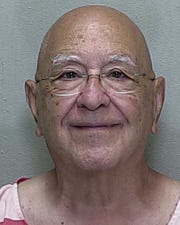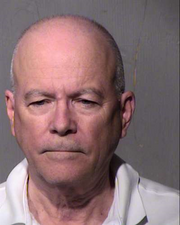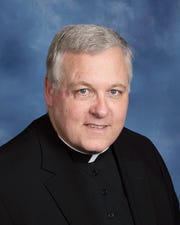Accused Priests Keep Retirement Benefits, but Not Legal Defense
By Beth LeBlanc
None of the priests facing sexual misconduct charges stemming from Attorney General Dana Nessel's investigation into clergy abuse in Michigan will get help paying for their legal defense from the Michigan dioceses where they used to work. Most will, however, continue receiving retirement benefits through their diocesan retirement plans because pensions are protected by federal law. For others not yet of retirement age, Michigan's various dioceses are required by canon or church law to provide "sustenance" for their priests leading up to and even after a potential guilty verdict. In May, Nessel charged five priests who had worked in three Michigan dioceses with sexual misconduct charges as part of the attorney general’s investigation in clergy sexual abuse in Michigan’s seven dioceses. At the time, Nessel said the charges were “just the tip of the iceberg” and more legal action is expected. The priests charged included the Revs. Neil Kalina, 63, and Patrick Casey, 55, who had served in the Detroit archdiocese; the Revs. Timothy Michael Crowley, 70, and Vincent DeLorenzo, 80, who served in the Lansing diocese; and the Rev. Jacob Vellian, 84, a visiting priest from India working in the Kalamazoo diocese in the 1970s at the time of the alleged incident. None of the charged priests were involved in active ministry at the time Nessel announced charges. All of the priests, with the exception of Vellian, have been arraigned on their charges and face sentences that carry maximum penalties ranging from 15 years to life in prison. Casey is scheduled for a June 20 preliminary examination; Crowley, DeLorenzo and Kalina are expected to be transported to Michigan jails by the end of June; and the attorney general is exploring ways to extradite Vellian from India. Protected pensions Nessel’s office could not pursue the pensions supporting the charged priests, many of whom are of or past retirement age, Nessel's spokeswoman Kelly Rossman-McKinney said. But pending a conviction the office could help the Michigan Department of Corrections to pursue prisoner assets through the State Correctional Facility Reimbursement Act, she said.
Five of Michigan's dioceses said they have no policy to take away retirement benefits from an accused cleric or lay employee. Many noted those benefits were earned by the priests and, by federal law, can’t be taken away. Two spokeswomen for the Diocese of Grand Rapids said they did not have access to the dioceses' policies on priest pensions or legal defenses. A spokeswoman for the Diocese of Kalamazoo said Vellian would not receive any money for legal costs, but would not comment on diocesan policies regarding priest retirement or legal defense "since they are not applicable here." In Detroit, priests' pensions in the archdiocese come to the about $1,550 a month, said Ned McGrath, a spokesman for the Archdiocese of the Detroit. The plan and trust are protected by the Internal Revenue Service. “If a priest is qualified for a pension, based on number of years of service, the diocese is not legally permitted to take away a pension,” the archdiocese posted on its website. Archdiocesan priests stop accruing years of service or credited service if they are placed on a leave of absence because of sexual misconduct allegations. But that time is reinstated if the allegations are found to be without merit. Though the pension is already earned by the priest, parishioners in some dioceses are still supporting the fund. In the Archdiocese, a special collection, called “With Thanks for their Service in Christ,” was started more than a decade ago when the archdiocese realized the Priests Pension Fund “was underfunded and needed more money.” In most parishes, the money taken up during that collection offsets the $11,525 annual assessment each parish is required to pay for each priest working in that church, McGrath said. The Diocese of Lansing was unable to confirm whether DeLorenzo or Crowely received retirement benefits from the diocese, but Patrick O’Brien, a spokesman for the diocese, said he presumed they are. Both Kalina and Vellian are religious order priests who served in the Detroit and Kalamazoo dioceses for a limited number of years and thus would not be part of the diocesan pension plans. The Michigan Catholic Conference administers many of the retirement benefits agreed to within dioceses, which differ from place to place, but has no decision-making authority regarding the details of the plans, said David Maluchnik, a spokesman for the group. “Our responsibility is to administer those benefits as they exist in the plan,” Maluchnik said. Church law requires 'sustenance' Priests also are entitled to "sustenance" from their diocese if they do not receive a pension or other income. The sustenance offered priests differs from diocese to diocese, but usually includes "decent support" and health benefits.
That sustenance is described as a "right" in guidelines published on the Vatican website in April 2000 and appears to be required until or unless a priest is laicized. "...it is not the quantity of services performed that needs to be recognized and proportionately compensated, but rather the person of the cleric, who offers his services, or should offer his services, for reasons other than those which would motivate the average laborer," the Vatican website said. Canon law requires dioceses to sustain their priests, "regardless of their status," McGrath said. The archdiocese's sustenance includes $1,550 a month — the current pension amount — plus health benefits, but an exception would be made if the priest in question was already receiving outside income or pension payments. The Diocese of Lansing has no priests alleged to have abused minors who would be eligible for sustenance, O'Brien said. But, in general, the diocese continues to pay salary and benefits to a priest on a leave absence while an allegation is reviewed, O'Brien said. If the bishop determines the allegation is credible, the diocese would provide sustenance at the state's current poverty rate if the priest had no other income. Should the priest be criminally convicted of abusing a minor, "the diocese would make every attempt not to provide any pay or benefits," O'Brien said. "If the convicted priest wanted to make an appeal for remuneration, he would be permitted to do that under canon law." Contact: eleblanc@detroitnews.com
|
.
Any original material on these pages is copyright © BishopAccountability.org 2004. Reproduce freely with attribution.


